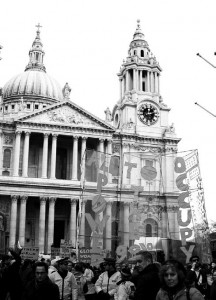 The Occupy movement was borne largely out of a sense of frustration and anger at the fact that those at the top of the pile, whose out-of-control behaviour cost the global economy trillions and caused incalculable suffering around the world, are getting away with it. Many have questioned why it took so long for people to rise up against the financial institutions and why – now that they have – there are not more people on the streets. A recent YouGov poll may give us an insight into why this is the case.
The Occupy movement was borne largely out of a sense of frustration and anger at the fact that those at the top of the pile, whose out-of-control behaviour cost the global economy trillions and caused incalculable suffering around the world, are getting away with it. Many have questioned why it took so long for people to rise up against the financial institutions and why – now that they have – there are not more people on the streets. A recent YouGov poll may give us an insight into why this is the case.
The poll revealed that 44% of those surveyed blame the Eurozone crisis for low growth in the UK economy, while just 31% blame the banks. The same poll showed that more people (32%) blamed the previous Labour government ?for the state of the economy than the coalition (28%).
Why is it that the banks are not being held responsible by the people for the state of the economy? It was, after all, the reckless gambling of highly leveraged derivatives and other financial products between financial institutions that led to the near-collapse of the banking system, which in turn led to governments running up massive deficits in order to bail them out. The subsequent recession and debt crisis were direct consequences of this.
To a large extent banks have been shielded from the worst of the blame by those in power. David Cameron and the coalition government have actively sought to deflect blame away from the banks and financial institutions and on to politically convenient targets. First the target fell on the Labour government. Then public spending was to blame – which provided cover for the coalition to enact their deep and wide-ranging programme of public sector cuts. Now, according to the coalition, the weak economy is the fault of the Eurozone crisis. This is despite the fact that nearly every single commentator and economist – including Mervyn King, governor of the Bank of England – have argued that the effects of the Eurozone crisis have yet to filter through to the UK economy.
Blaming Labour was politically savvy and not entirely without merit. Labour failed to provide an alternative to the neo-liberal economic consensus and allowed deregulation to continue unchecked. Blaming public spending for the financial crisis, however, is complete and utter nonsense. Aside from the fact that it is an investment in the country and pays for itself, public spending no more caused the financial crisis than Nick Clegg influenced coalition policy. No amount of British teachers, binmen or police officers can be said to have caused the collapse of the sub-prime market in the US which led us into the global financial crisis. As for the Eurozone crisis, this development will undoubtedly have a negative impact on our economy in the coming months, but blaming it for weak growth is coalition misinformation designed to deflect attention away from their damaging economic policies. It is also disingenuous to separate the Eurozone crisis from the financial crisis – the Eurozone crisis is merely an extension of the financial crisis.
The coalition line on the causes of the crisis has been reinforced by their friends in the media. Most of Britain’s best-selling newspapers are Tory-leaning, as are the political editors of both the BBC and Sky. These media powerhouses have subtly, and in some cases blatantly, helped to change the language of the debate around the financial crisis into a dialogue of debt crisis – often ignoring the fact that the debt crisis is a direct consequence of the financial crisis. A perfect example of this could be seen on the BBC’s ‘Your Money and How They Spend It’, in which political editor Nick Robinson linked the financial crisis to public spending.
The danger of this approach is that if the correct causes of the crisis is ignored, then how are these causes to be tackled? The government, with the backing of their financiers and allies in the media, has attempted to pull the wool over our eyes and use the crisis to launch ideological attacks on the public sector and on government spending, whilst deflecting any attempts to reform the financial sector. The reforms recommended in the Vickers report have been shelved, the banks have been given a tax cut and – aside from the bonus tax – the sector has paid nothing towards cleaning up the mess of its own creation. Meanwhile the ordinary person on the street is paying a heavy price; in particular the poor, the young, the elderly and women.
One of Occupy’s most important tasks is to refocus public attention back to where it is required in order to motivate politicians into taking the necessary action required to sort out the bankers mess – and to ensure that this never happens again.
By David Robinson







